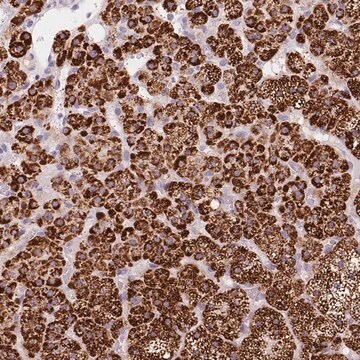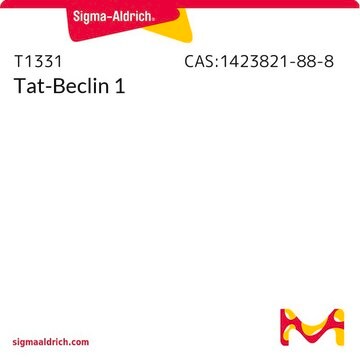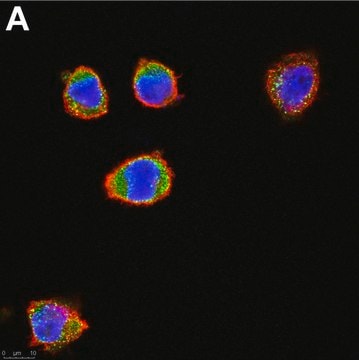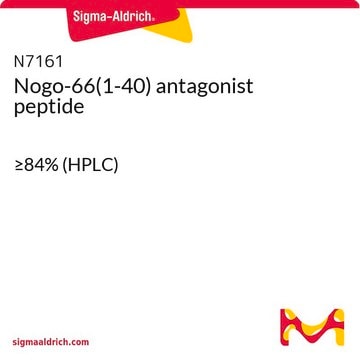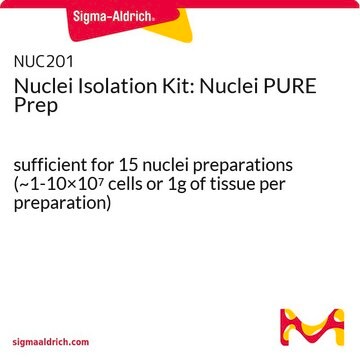Recommended Products
biological source
rabbit
Quality Level
antibody form
affinity isolated antibody
antibody product type
primary antibodies
clone
polyclonal
species reactivity
human, mouse
packaging
antibody small pack of 25 μg
technique(s)
immunohistochemistry: suitable (paraffin)
western blot: suitable
isotype
IgG
NCBI accession no.
UniProt accession no.
shipped in
ambient
target post-translational modification
unmodified
Gene Information
mouse ... Becn2(226720)
General description
Beclin-2 (UniProt: P0DM65) is encoded by Becn2 gene (Gene ID: 226720) in murine species. Beclin-2 is a member of the Atg6/Beclin family and is involved in 2 distinct lysosomal degradation pathways and acts as a regulator of autophagy and as a regulator of G-protein coupled receptors turnover. It regulates degradation in lysosomes of a variety of G-protein coupled receptors via its interaction with GPRASP1/GASP1. Beclin-2 family members are specific to mammals whereas Becln-1 subfamily members are present in more primitive vertebrates. Beclin-2 interacts with ATG14, AMBRA1, UVRAG and PIK3C3/VPS34 and this interaction is not disrupted by starvation. It is expressed in brain, skeletal muscle, placenta, thymus and uterus and expression is lower in liver, testis, stomach, and 17-day-old embryos. Disruption of Beclin-2 is shown to reduce embryonic viability and heterozygous knockout mice show defects in autophagy, increased levels of Cnr1 receptor, elevated food intake, and obesity and insulin resistance. (Ref.: He, C. et al. (2013). Cell 154, 1085-1099).
Specificity
This rabbit polyclonal antibody detects Becline-2 in murine cells. It targets an epitope within 14 amino acids from the N-terminal.
Immunogen
Epitope: unknown
KLH-conjugated linear peptide corresponding to 14 amino acids from the N-terminal region of murine Beclin-2.
Application
Anti-Beclin-2 Antibody, Cat. No. ABC253, is a rabbit polyclonal antibdoy that detects Beclin-2 and has been tested for use in Immunohistochemistry (Paraffin) and Western Blotting.
Immunohistochemistry Analysis: A 1:250 dilution from a representative lot detected Beclin-2 in human brain (thalamic region) and mouse stomach tissues.
Research Category
Apoptosis & Cancer
Apoptosis & Cancer
Quality
Evaluated by Western Blotting in Beclin2 +/+ Mouse Brain (Wild-Type).
Western Blotting Analysis: 2 µg/mL of this antibody detected Beclin-2 in lysate from Beclin-2 +/+ Mouse Brain (Wild-type).
Western Blotting Analysis: 2 µg/mL of this antibody detected Beclin-2 in lysate from Beclin-2 +/+ Mouse Brain (Wild-type).
Target description
~50 kDa observed; 50.29 kDa calculated. Uncharacterized bands may be observed in some lysate(s).
Physical form
Affinity Purified
Format: Purified
Purified rabbit polyclonal antibody in buffer containing 0.1 M Tris-Glycine (pH 7.4), 150 mM NaCl with 0.05% sodium azide.
Purified rabbit polyclonal antibody in buffer containing 0.1 M Tris-Glycine (pH 7.4), 150 mM NaCl with 0.05% sodium azide.
Storage and Stability
Stable for 1 year at 2-8°C from date of receipt.
Stable for 1 year at 2-8°C from date of receipt.
Other Notes
Concentration: Please refer to lot specific datasheet.
Disclaimer
Unless otherwise stated in our catalog or other company documentation accompanying the product(s), our products are intended for research use only and are not to be used for any other purpose, which includes but is not limited to, unauthorized commercial uses, in vitro diagnostic uses, ex vivo or in vivo therapeutic uses or any type of consumption or application to humans or animals.
Not finding the right product?
Try our Product Selector Tool.
Storage Class Code
12 - Non Combustible Liquids
WGK
WGK 1
Certificates of Analysis (COA)
Search for Certificates of Analysis (COA) by entering the products Lot/Batch Number. Lot and Batch Numbers can be found on a product’s label following the words ‘Lot’ or ‘Batch’.
Already Own This Product?
Find documentation for the products that you have recently purchased in the Document Library.
Yoon-Jin Kim et al.
Science advances, 7(8) (2021-02-21)
Drug abuse is a foremost public health problem. Cocaine is a widely abused drug worldwide that produces various reward-related behaviors. The mechanisms that underlie cocaine-induced disorders are unresolved, and effective treatments are lacking. Here, we found that an autophagy-related protein
Our team of scientists has experience in all areas of research including Life Science, Material Science, Chemical Synthesis, Chromatography, Analytical and many others.
Contact Technical Service